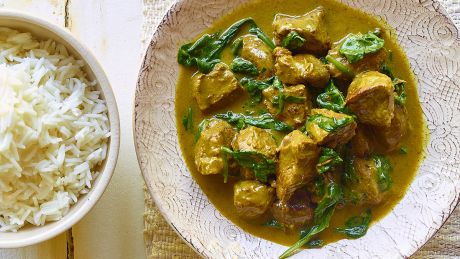The Health Benefits Of European Lamb Will Make You Wonder Why You Haven’t Been Eating More Of The Stuff
It’s packed with protein and essential vitamins and minerals, so it’s smart to make lamb part of your diet

The appeal of lamb starts with its distinctive taste, which shines through whether you eat it as part of a spicy curry, in Turkish pides, in a tagine or as a slow-roasted leg with a dab of mint sauce. However, there are many more reasons to eat lamb. First and foremost is that red meat plays its part in a healthy, balanced diet as long as you keep to the recommended limit of 70g a day (that’s cooked weight, and includes processed meat too). For lamb, that’s a portion roughly the size of a pack of cards, and it’s a great choice for your daily portion of red meat thanks to the essential macronutrients, vitamins and minerals it contains.
The chief macronutrient that’s of benefit to you is protein, and 100g of lean lamb (that’s in its raw state; it’ll lose about 20%-30% of its weight through cooking – make sure you cook it) contains 20g of protein. We all need plenty of protein in our diet to maintain healthy muscles and bones, but all conscientious gym regulars make especially sure to get lots of the stuff, because protein is important for muscle growth.
While drinking a processed protein shake in the locker room after a workout is a convenient way of getting all the protein you need, you cannot and would not want to live by protein alone, and lamb also contains considerable amounts of seven important vitamins and minerals.
Even if you’re a health-conscious type who checks out the protein, carbohydrate and fat content of everything you eat, the odds are you lose focus by the time you reach the vitamin and mineral stats of your food. But that doesn’t stop them being essential for keeping your body in good working order.
Let’s start with the B vitamins: niacin (B3), B6 and B12 are all found in rich quantities in lamb. Niacin plays an important role across a wide range of bodily functions, including helping with energy production, so if you need five espresso shots to get through the afternoon, adding a niacin-rich food like lamb to your plate can help reduce tiredness in the long run.
Vitamin B6 can also help on this front, and it also supports your immune system, while the essential role vitamin B12 plays in the body is perhaps best shown by what happens when your diet is deficient in it – extreme fatigue, pallor and breathlessness are all symptoms of B12 deficiency. It’s so important that an entire episode of House was based on a patient deficient in B12 (there was a tapeworm, it got weird).
Lamb is also rich in zinc, which should be music to the ears of any prospective parents, because it’s a mineral that helps with fertility and reproduction as well as supporting healthy hair, nails and skin.
Along with these four vitamin and minerals, lamb is also a source of potassium, phosphorus and pantothenic acid. We’re not expecting you to know what all those things do, but if you want healthy bones and blood pressure, you want those characters in your diet.
Speaking of blood pressure, the health benefits of lamb extend beyond what is in it to what isn’t. It’s naturally low in sodium, which means it will help you maintain normal blood pressure. This is a real bonus, because you know what isn’t low in sodium? The typical British diet. So it’s always useful to cut down where you can.
However, choosing whether or not to eat a food is about more than just what’s in it or not in it these days – you also want to know where it comes from, and lamb scores well on that count too. The vast majority of European lamb comes from sustainable farms that are found in remote areas where other types of commercial agriculture are impossible to maintain because of the rugged conditions, making it an essential part of the life and economy of rural communities.
Whether you’re a person who views meat as an essential part of every meal or someone who enjoys it as a treat a couple of times a week, lamb merits a place on your plate. It’s versatile enough to work well in all kinds of recipes, and you’ll know that you’re getting a high-quality, sustainable source of protein and lots of other nutrients every time you eat it.
Visit trylamb.eu to find more healthy recipes, from quick and easy midweek meals to melt-in-the-mouth slow-cooked dishes.
The content of this promotion campaign represents the views of the author only and is his/her sole responsibility. The European Commission and the Consumers, Health, Agriculture and Food Executive Agency (CHAFEA) do not accept any responsibility for any use that may be made of the information it contains.

Get the Coach Newsletter
Sign up for workout ideas, training advice, reviews of the latest gear and more.
Coach is a health and fitness title. This byline is used for posting sponsored content, book extracts and the like. It is also used as a placeholder for articles published a long time ago when the original author is unclear. You can find out more about this publication and find the contact details of the editorial team on the About Us page.

